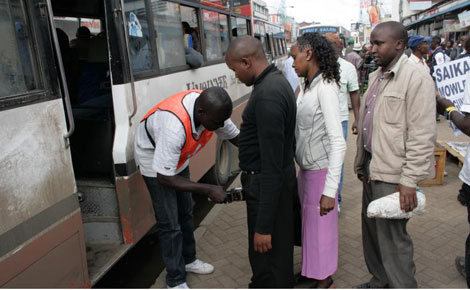 |
|
An employee of Umoinner Matatus screen passengers at the Matatu stage along Ronald Ngala street on Monday,April 14.This is a way of reducing cases of terrorism and common thuggery.[ PHOTO:COLLINS KWEYU/STANDARD] |
Commuters in Nairobi are staring at a transport crisis from Tuesday next week when new rules requiring matatu crews to implement electronic payment systems take effect.
Matatu owners said of the over 20,000 vehicles, only about 2,000 had complied by yesterday, as police vowed to crack down on any crews caught collecting cash from passengers.
Nairobi has a population of more than three million people, who mostly use matatus to their places of work. Non-compliant crews face fines of not more than Sh100,000 and prison terms not exceeding one year, according to regulations gazetted by Transport Cabinet Secretary Michael Kamau in September last year.
They could also be charged for other traffic offences. The cashless system will first be implemented in Nairobi before being rolled out to other parts of the country. The possibility of a crisis became clear when Nairobi Traffic Commandant Charlton Muriithi and the National Transport and Safety Authority (NTSA) announced they would push matatu owners to comply, since they had been given ample time.
Under the rules, passengers are required to have electronic cards loaded with cash, which they then swipe on machines installed in the matatus to pay fares.
Unprecedented crisis
In other systems already in use, passengers swipe the cards with the crew’s mobile phones. Some bus companies are using Safaricom’s Lipa na Mpesa in which the telecommunications firm, assigns till numbers to businesses for free.
Customers can then pay via the mobile money system by navigating through their phones’ M-pesa menu and transferring cash to the till number.
Others in the market are 1963 Jinice, operated by Matatu Owners Association, Equity Bank and Google’s BebaPay and Abiria Card, a joint effort between Kenya Bus Service and Kenya Commercial Bank.
Matatu Owners Association Chairman Simon Kimutai said about 40,000 people now have Jinice cards, while Equity did not respond to our queries.
Safaricom Corporate Affairs Director Nzioka Waita said they have registered 3,000 matatus and taxis.
However, a survey by The Standard on Saturday showed many city residents had no idea where to get the cards, how to load them or how the concept works.
Mr Kimutai said as things stand now, passengers and crews are not ready and any attempt to force it could lead to unprecedented crisis. He said the service providers are not enough to distribute cards to all Nairobi residents and have all matatus hooked to the system.
“We have to be sincere. We have only a small fraction of vehicles that have complied with the requirement. It will not be possible to implement it at once because currently, the service providers are slow since some are still awaiting approval from the Central Bank,” said Kimutai.
Approval by the Central Bank of Kenya is meant to protect money deposited by passengers in much the same way cash in debit and credit cards is shielded from criminals. However, NTSA chairman Lee Kinyanjui said nothing would stop the Government from implementing the rules, which take effect on July 1 (Tuesday).
He said: “We have been in talks for the past six months and by now the operators should have made arrangements on how they will be using cashless services.”
Stay informed. Subscribe to our newsletter
He said none of the companies currently in the piloting system had reported shortfalls. One of the aims of the cashless system is to bring the matatu industry, reported to be worth about Sh200 billion, into the tax bracket.
It has also been trumpeted as a sure way of eliminating corruption and cartels that collect millions from crews every day. It is also expected to bring some order in the chaotic matatu industry.
The notice by the Transport PS reads: “With effect from 1st July, 2014 all PSV Operators licensed under these regulations will be required to implement and operate a cashless payment system for all fares.”
It goes on: “A person who fails to comply with any provision of these regulations commits an offence and in addition to any other penalties available under law shall on conviction be liable to a fine of not less than Sh100,000 or to imprisonment for a term not exceeding one year.”
Tough warning
With police planning to inspect matatus on Tuesday, crews could decide to withdraw vehicles to avoid arrest.
Traffic Commandant Charlton Muriithi told The Standard on Saturday that the law and penalties were clearly spelt out. He said: “We are ready to enforce any laws and this is not an exception. We will ensure traffic laws are observed to the letter.”
Asked what would happen to passengers yet to acquire the automated cards, Muriithi said it would be the task of each matatu crew to ensure all passengers have them.
Kenya Bus Service managing director Edwins Mukabana, while welcoming the new technology, said it had also come with its challenges. He said the firm had so far installed 100 vehicles with the swiping machines while the rest are expected to be fitted before the deadline expires.
He said: “There is a generally good perception because people are signing up and we expect the number to rise.”
He said they had not however understood how or what will happen in some scenarios such as when passengers need refunds when the journey is terminated.
However, the system is facing resistance from the Consumers Federation of Kenya (Cofek), which said it should be optional and not mandatory.
Cofek’s CEO Stephen Mutoro claimed the government is serving the interests of private sector at the expense of the public.
He said Cofek would move to court on Tuesday to stop implementation of the regulations.
He said: “This will make the lives of Kenyans hard. What will happen to those who don’t even own mobile phones or bank accounts?”
Mutoro said although the cards are free, cost of installing the equipment will be passed to the final consumer.
Few fans
The tap-to-pay technology was touted as a solution to many of the problems bedeviling the public transport industry.
The system however has few fans, even among the matatu crews. Passengers are of the view that matatu crews were the greatest hindrance to implementation of the plan. Starting July 1, it will be illegal for matatus to collect cash from passengers, according to the transport regulations gazetted in February.
 The Standard Group Plc is a
multi-media organization with investments in media platforms spanning newspaper
print operations, television, radio broadcasting, digital and online services. The
Standard Group is recognized as a leading multi-media house in Kenya with a key
influence in matters of national and international interest.
The Standard Group Plc is a
multi-media organization with investments in media platforms spanning newspaper
print operations, television, radio broadcasting, digital and online services. The
Standard Group is recognized as a leading multi-media house in Kenya with a key
influence in matters of national and international interest.
 The Standard Group Plc is a
multi-media organization with investments in media platforms spanning newspaper
print operations, television, radio broadcasting, digital and online services. The
Standard Group is recognized as a leading multi-media house in Kenya with a key
influence in matters of national and international interest.
The Standard Group Plc is a
multi-media organization with investments in media platforms spanning newspaper
print operations, television, radio broadcasting, digital and online services. The
Standard Group is recognized as a leading multi-media house in Kenya with a key
influence in matters of national and international interest.







